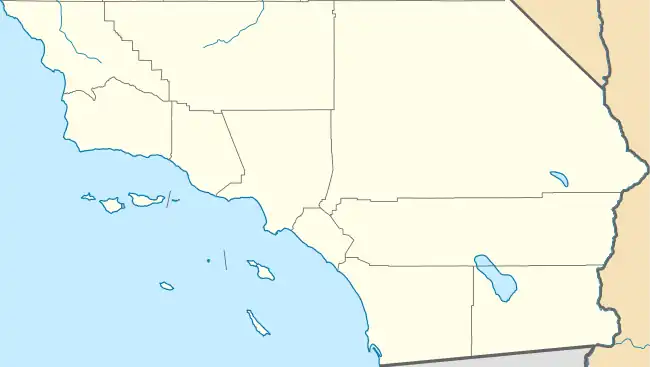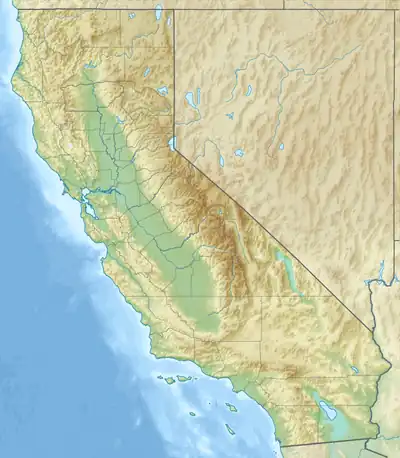| Carpenter Summit | |
|---|---|
 Location in California  Carpenter Summit (California) | |
| Elevation | East bound 4,052 feet (1,235 m) West bound at 4,078 feet (1,243 m) |
| Location | San Diego County, California |
| Range | Cuyamaca Mountains |
| Coordinates | 32°49′8″N 116°34′48″W / 32.81889°N 116.58000°W |
Carpenter Summit is a highway pass name approved through the United States Geological Survey. This pass was created during the construction of I-8 from 1972 to 1974 in this area, but was never named unlike the three other 4,000 feet (1,200 m) then named during construction.[1] The name “Carpenter Summit” was proposed in late 2019 then submitted and as of October 2020 pending the various levels of place name acceptance.
This highway pass is the first of four which were completed through the Cuyamaca Mountains of southeastern San Diego County, California and traversed by Interstate 8 East bound at an altitude of 4,052 feet (1,235 m) and West bound at 4,078 feet (1,243 m). The freeway is divided at this location by an east–west ridge with a peak of 4,120 feet (1,260 m).
Google Street view of I-8 East bound 4,000 foot elevation sign. Google Street view of I-8 West bound 4,000 foot elevation sign.
Of the four 4,000 feet (1,200 m) highway summits eastward of San Diego, the Laguna Summit is the second. The third is Crestwood Summit followed by the Tecate Divide.[2][3]
Construction
The Interstate 8 route was realigned from Arnold Way onto Alpine Boulevard as it passed through Alpine and the Viejas Indian Reservation, before entering the Laguna Mountains and the Cleveland National Forest mostly paralleling the alignment used by old US 80.[4]
By August 1970, the remainder of the freeway had been funded in this area, with the part from Japatul Valley Road to Laguna Junction costing $22 million (about $129 million in 2022 dollars),[5] [6] (about $88 million in 2022 dollars).[5]
By the beginning of 1974, the new projected completion date for this I-8 section was mid-1975, with 22 miles (35 km) of two-lane highway remaining.[7] The new Pine Valley Creek bridge and the segment extending from Japatul Valley Road to Pine Valley was dedicated on November 24, 1974, and was scheduled to open on November 26; this left 8 miles (13 km) of freeway to be constructed.[8] The final stretch of I-8 in California, from Sunrise Highway to La Posta Road, was completed in May 1975.[9]
References
- ↑ “AA Roads” Interstate 8 West - California 79 to Sunset Cliffs Boulevard | item 61 | retrieved October 1, 2020| Note: "Descending toward Pine Valley, Interstate 8 again passes below 4,000 feet. The freeway will attain this elevation one more time before traveling down toward the coast."
- ↑ Summit information by district, county, route, and postmile, California Department of Transportation, archived from the original on 2017-03-01, retrieved 2017-06-02
- ↑ Fetzer, Leland (2005), San Diego County Place Names, A to Z, Adventures in the natural history and cultural heritage of the Californias, Sunbelt Publications, pp. 145–146, ISBN 9780932653734
- ↑ Brandais, Jac (November 25, 2006). "80 at 80 - Old highway a reminder of bygone days in East County". San Diego Union-Tribune. p. L1.
- 1 2 Johnston, Louis; Williamson, Samuel H. (2023). "What Was the U.S. GDP Then?". MeasuringWorth. Retrieved November 30, 2023. United States Gross Domestic Product deflator figures follow the Measuring Worth series.
- ↑ Clance, Homer (August 9, 1970). "Area Freeway Work Costs $107.5 Million". The San Diego Union. p. B1. OCLC 13155544.
- ↑ "Public's Mood Shifts Away From Freeways". The San Diego Union. January 8, 1974. p. X16. OCLC 13155544.
- ↑ "Pine Valley Creek Bridge Dedicated". The San Diego Union. November 24, 1974. pp. B1, B4. OCLC 13155544.
- ↑ Harrison, Donald (May 25, 1975). "Last Section Of Interstate 8 To Yuma Opens Thursday". The San Diego Union. p. B10. OCLC 13155544.
See also
- Interstate 8 at California Highways
- Interstate 8 at the Interstate Guide
- Interstate 8 in California and Arizona at AA Roads